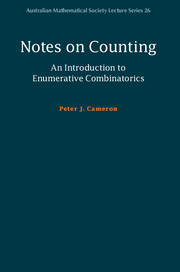Description
Notes on Counting: An Introduction to Enumerative Combinatorics
Australian Mathematical Society Lecture Series
Author: Cameron Peter J.
An introduction to enumerative combinatorics, vital to many areas of mathematics. It is suitable as a class text or for individual study.
Language: English
Subject for Notes on Counting: An Introduction to Enumerative...:
Approximative price 107.81 €
In Print (Delivery period: 14 days).
Add to cart
Notes on Counting: An Introduction to Enumerative Combinatorics
Publication date: 06-2017
234 p. · 15.6x23.5 cm · Hardback
Publication date: 06-2017
234 p. · 15.6x23.5 cm · Hardback
Notes on Counting: An Introduction to Enumerative Combinatorics
Publication date: 06-2017
234 p. · 15.2x22.7 cm · Paperback
Publication date: 06-2017
234 p. · 15.2x22.7 cm · Paperback
Description
/li>Contents
/li>Biography
/li>
Enumerative combinatorics, in its algebraic and analytic forms, is vital to many areas of mathematics, from model theory to statistical mechanics. This book, which stems from many years' experience of teaching, invites students into the subject and prepares them for more advanced texts. It is suitable as a class text or for individual study. The author provides proofs for many of the theorems to show the range of techniques available, and uses examples to link enumerative combinatorics to other areas of study. The main section of the book introduces the key tools of the subject (generating functions and recurrence relations), which are then used to study the most important combinatorial objects, namely subsets, partitions, and permutations of a set. Later chapters deal with more specialised topics, including permanents, SDRs, group actions and the Redfield?Pólya theory of cycle indices, Möbius inversion, the Tutte polynomial, and species.
1. Introduction; 2. Formal power series; 3. Subsets, partitions and permutations; 4. Recurrence relations; 5. The permanent; 6. q-analogues; 7. Group actions and cycle index; 8. Mobius inversion; 9. The Tutte polynomial; 10. Species; 11. Analytic methods: a first look; 12. Further topics; 13. Bibliography and further directions; Index.
Peter J. Cameron is a Professor in the School of Mathematics and Statistics at the University of St Andrews, Scotland. Much of his work has centred on combinatorics and, since 1992, he has been Chair of the British Combinatorial Committee. He has also worked in group and semigroup theory, model theory, and other subjects such as statistical mechanics and measurement theory. Peter J. Cameron is the recipient of the Senior Whitehead Prize of 2017 from the London Mathematical Society.
© 2024 LAVOISIER S.A.S.
These books may interest you

Enumerative Combinatorics 74.82 €



